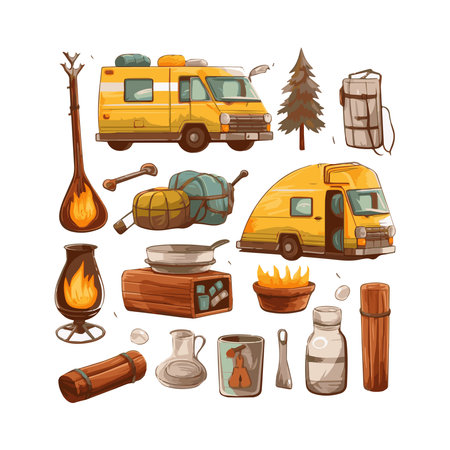Introduction: Saying Goodbye to Plastic in British Campsites
In recent years, British camping culture has witnessed a noticeable shift away from the once-ubiquitous plastic furniture that dominated campsites and caravan parks across the country. This movement is more than a fleeting trend; it’s driven by growing environmental awareness and a collective desire to reduce our impact on the natural world. Campers, site owners, and outdoor enthusiasts are increasingly turning their backs on plastic tables, chairs, and benches in favour of more sustainable alternatives such as timber and metal. The decline of plastic furniture is not just about aesthetics or nostalgia for traditional materials—it’s rooted in serious concerns about plastic pollution, landfill waste, and the long-term durability of camping equipment. As Britain grapples with climate change and strives for greener living, the camping community is setting an example by embracing eco-friendlier choices that reflect both practicality and respect for the countryside.
2. Why Timber and Metal? Durability and British Weather
When it comes to camping furniture in Britain, the shift away from plastic is closely tied to our unique climate. The UK is well-known for its unpredictable weather – persistent rain, gusty winds, and damp conditions are part and parcel of outdoor adventures here. This environment poses significant challenges to furniture materials. While plastic may be lightweight and initially inexpensive, it often struggles with durability, becoming brittle, fading, or warping under constant exposure to moisture and fluctuating temperatures.
Timber and metal emerge as preferred alternatives largely due to their resilience in these conditions. Hardwoods such as oak or teak, when properly treated, offer natural resistance against rot and moisture. Metals like aluminium and powder-coated steel provide strength against wind while resisting rust if maintained correctly. Both materials have a proven track record in standing up to the demands of British weather.
Comparing Material Performance in UK Conditions
| Material | Resistance to Rain | Wind Stability | Lifespan | Maintenance Needs |
|---|---|---|---|---|
| Plastic | Poor – prone to cracking & fading | Low – lightweight, may blow away | Short (1-3 years) | Minimal but degrades quickly |
| Timber (Treated) | Good – resists rot with treatment | Moderate – heavier than plastic | Long (5-15+ years) | Occasional oiling/sealing required |
| Metal (Aluminium/Steel) | Excellent – rust-resistant options available | High – sturdy & stable | Very Long (10-20+ years) | Sporadic cleaning, check for corrosion |
The British Context: Practicality over Novelty
The practicality of timber and metal reflects a wider British preference for products that endure rather than simply look good on day one. When you’re setting up camp on the shores of Loch Lomond or pitching a tent on Dartmoor, you want kit that won’t let you down after a single wet weekend. Timber’s natural warmth fits well with traditional British aesthetics, while metals suit modern tastes and offer confidence during those infamous summer squalls.
This combination of durability and suitability for our climate means timber and metal furniture isn’t just a passing trend; it’s an informed choice based on long-term value and reliability in true British conditions.

3. Top Timber Choices for Camping Furniture
As Britain moves away from plastic, timber has become a preferred material for camping furniture, valued for its durability, aesthetics, and sustainable credentials. Choosing the right wood involves understanding both the source of the timber—whether it is locally grown or imported—and the unique qualities each species brings to outdoor use.
Oak: The British Classic
Oak stands out as one of Britain’s most cherished hardwoods, often sourced from local forests and estates. Its dense grain makes it exceptionally robust and resistant to the unpredictable British weather, making it a top choice for tables, chairs, and benches. Oaks natural tannins also provide a measure of resistance against rot and insect damage, extending the lifespan of camping furniture used across the seasons.
Beech: Versatile and Homegrown
Another popular option is beech, which is widely available throughout the UK. Beechwood boasts a fine, even texture that lends itself well to smooth finishes and rounded edges—ideal for portable stools and folding camp tables. While not as weather-resistant as oak, beech is lightweight and relatively easy to work with, making it a favourite among local craftsmen producing small-batch or bespoke outdoor furniture.
Pine: Affordable and Sustainable
Pine is commonly used for budget-friendly camping furniture. Much of the pine in Britain comes from fast-growing plantations in Scotland and northern England, ensuring a renewable supply. Though softer than hardwoods like oak or beech, pine can be treated to improve its resistance to moisture and pests. Its lighter weight also appeals to campers seeking portability without compromising too much on strength.
Teak: Imported Durability
For those seeking premium performance, teak remains an aspirational choice despite its higher price point and imported status—primarily from Southeast Asia. Teak’s natural oils confer exceptional resistance to water, mould, and insects, making it ideal for luxury camping setups or glamping sites that demand longevity with minimal maintenance. However, sustainability concerns mean that responsibly sourced teak (with FSC certification) should always be prioritised.
Ash and Acacia: Niche Alternatives
Ash, occasionally sourced from British woodlands, offers good flexibility and shock resistance—suitable for folding frames or slatted surfaces. Acacia, sometimes imported but increasingly cultivated in the UK for environmental reasons, provides hardiness similar to teak but at a lower cost.
Conclusion: Timber Selection Matters
The choice of timber for camping furniture in Britain is shaped by considerations of origin, sustainability, durability, and appearance. Whether opting for traditional oak or experimenting with new alternatives like acacia, British campers are increasingly mindful of how their choices impact both their outdoor experience and the environment.
4. British-Made Metal Camping Furniture: A Modern Classic
As plastic furniture fades from the UK’s campsites, British-made metal camping furniture is enjoying a well-deserved renaissance. The United Kingdom boasts a rich heritage of metalworking, and this tradition lives on in contemporary outdoor gear. Whether you’re after the minimalism of foldable aluminium chairs or the robust durability of steel tables, British manufacturers are leading the way in marrying craftsmanship with modern needs.
Leading British Manufacturers
The following table highlights some prominent UK brands known for their quality metal camping furniture:
| Manufacturer | Specialty | Notable Features |
|---|---|---|
| Kampa | Aluminium chairs & tables | Lightweight, portable, classic designs |
| Vango | Steel frame furniture | Sturdy build, weather-resistant coatings |
| Coleman UK | Hybrid metal systems | Innovative folding mechanisms, comfort focus |
| Outwell UK | Family-sized setups | Stainless steel accents, easy assembly |
Traditional Metalworking Techniques Reimagined
The resurgence of metal camping furniture is not merely a matter of nostalgia; it’s a testament to Britain’s ongoing commitment to quality engineering. Many pieces are produced using time-honoured techniques such as tube bending, rivet fastening, and precision welding—skills honed in Britain’s historic industrial heartlands. These methods ensure each item is both functional and durable, capable of withstanding the rigours of British weather from the Lake District to the Cornish coast.
Main Materials Used: Aluminium vs Steel
| Material | Main Attributes | Best For | Common Drawbacks |
|---|---|---|---|
| Aluminium | Lightweight, corrosion-resistant, easy to transport | Backpackers, festival-goers, family campers seeking portability | Slightly less sturdy than steel under heavy loads; can dent if mishandled |
| Steel (including stainless) | Tough, stable, long-lasting; can handle higher weight loads; often powder-coated for weather protection | Pitched campsites, glamping, group gatherings requiring robust furniture | Heavier to carry; may rust if coating is damaged (except stainless) |
The Modern Classic: Why Metal Endures on British Campsites
The fusion of traditional craft with modern materials has made British-made metal camping furniture a contemporary staple. As environmental awareness grows and plastic alternatives decline, campers across the UK are rediscovering the value of metal—both for its longevity and its connection to local manufacturing traditions. When you choose British-made metal furniture for your next adventure, you’re not just investing in comfort—you’re supporting home-grown industry and sustainable practices.
5. Sustainability, Repair, and Lifespan: An Engineer’s Perspective
From the standpoint of both environmental stewardship and practical engineering, the decline of plastic camping furniture in Britain is more than a fleeting trend—it reflects growing awareness of sustainability and longevity in outdoor gear. When comparing timber and metal furniture to their plastic counterparts, several key factors stand out for British campers considering their next purchase.
Environmental Impact: Beyond the Bin
Plastic camping furniture may seem convenient, but its environmental cost is significant. Most plastics are derived from fossil fuels, require high energy for production, and remain in landfills or nature for centuries. In contrast, sustainably sourced timber can be a renewable resource if managed properly; look for FSC (Forest Stewardship Council) certification when buying wooden chairs or tables. Metal options such as aluminium and steel are highly recyclable—Britain’s robust recycling infrastructure ensures that end-of-life metal products can often be repurposed rather than discarded.
Repairability: Keeping Gear Going
An underappreciated aspect of timber and metal camping furniture is ease of repair. A cracked plastic seat typically means a trip to the skip, while a loose bolt on a metal chair or a split in a timber slat can often be fixed with basic tools—a screwdriver, spanner, or even wood glue. Many local hardware shops across Britain stock suitable fixings and finishes, so you’re never far from what you need. Embracing repair not only saves money but also fosters a culture of resourcefulness valued by many British campers.
Lifespan: Built to Last
Durability is another area where timber and metal excel. Properly maintained wooden furniture can last for decades—regular oiling protects against the wet British climate, while sanding removes superficial marks. Metal frames resist rust if given an occasional wipe-down and stored dry; some modern powder-coated metals are especially resilient against corrosion. In comparison, plastic is prone to UV degradation (especially under the unpredictable UK sun), becoming brittle and unsafe over time.
Practical Tips for Campers in Britain
If you’re looking to invest in more sustainable camping kit:
- Choose locally-made or responsibly-sourced timber furniture to support British industries and reduce transport emissions.
- Opt for modular designs where parts can be easily replaced or repaired.
- Carry a small repair kit including spare screws, glue, and sandpaper on your trips—it pays off when something goes awry on a remote site.
- After each trip, store timber furniture in a dry shed or garage; for metal items, check joints for any moisture before putting them away.
In short, shifting away from plastic isn’t just an environmental gesture—it’s an investment in reliable kit that can see you through many seasons on the British Isles. By choosing well-made timber or metal pieces and caring for them with simple maintenance routines, campers contribute to both sustainability and tradition in the great outdoors.
6. Style and Authenticity: Embracing the British Outdoor Aesthetic
Timber and metal camping furniture is quietly reshaping the look and feel of outdoor life in Britain, offering a refreshing alternative to the once-ubiquitous plastic table and chair sets. For those who value both substance and style, these materials bring more than just durability—they embody a particular British character that resonates across generations and tastes.
The Contemporary Glamping Movement
Glamping has taken the UK by storm in recent years, with countryside retreats from Cornwall to the Highlands showcasing bell tents, shepherd huts, and yurts. Here, timber-framed chairs and sleek metal tables fit right in, blending rustic charm with modern comfort. The natural grains of oak or ash, paired with powder-coated steel or brushed aluminium, effortlessly elevate the aesthetic. It’s no longer about roughing it; it’s about curating an experience where every detail—from lanterns to camp stools—reflects a commitment to sustainability and style.
A Nod to Classic Countryside Traditions
Britain’s camping heritage stretches back decades, conjuring images of family picnics on checkered blankets beside weathered wooden benches. Metal-framed deckchairs were once staples at seaside resorts and village greens alike. Today’s timber and metal options pay homage to these traditions while updating them for today’s campers. Folding hardwood tables evoke memories of Scout camps and National Trust outings, yet offer improved ergonomics and portability.
Completing the British Camping Scene
Whether you’re sitting around a fire pit on Dartmoor or enjoying afternoon tea outside a Lake District cottage, timber and metal furniture integrates seamlessly into its surroundings. Its understated elegance complements both the wild landscapes of Scotland and the manicured lawns of southern England. Unlike plastic, which can jar against natural settings, wood and metal age gracefully—gaining character with each outing rather than wearing out.
In embracing timber and metal, British campers are not just making practical choices; they are expressing an appreciation for authenticity and a deep connection to place. This movement away from plastic is as much about taste as it is about ethics—a conscious decision to invest in objects that tell a story and enhance the unique atmosphere of outdoor life across the UK.
7. Conclusion: Making the Swap – Practical Advice for the Modern Camper
Transitioning from plastic to timber and metal camping furniture is more than a passing trend; it reflects a growing awareness among British campers of environmental responsibility and a desire for longevity in their outdoor gear. If you are considering making this change, here’s how to get started.
Sourcing Sustainable Options
Begin by researching reputable UK retailers or specialist suppliers who prioritise sustainable practices. Many independent shops in the Lake District, Cornwall, and the Scottish Highlands offer handcrafted wooden stools, foldable oak chairs, and aluminium tables made by local artisans. Attending country fairs or outdoor expos often provides direct access to craftspeople and their wares.
Purchasing Wisely
When shopping for non-plastic camping furniture, inspect for FSC-certified timber or responsibly sourced metals. Look for items that are designed to be flat-packed or modular, which can make transport easier on British public transport or in compact cars. Don’t hesitate to ask sellers about their sourcing policies—most local craftsmen are proud to discuss their materials and methods.
Maintenance Matters
Caring for timber and metal furniture ensures your investment lasts through many seasons. Store items in a dry shed or garage when not in use, and apply beeswax or oil to wood once or twice a year to protect against the damp British climate. For metal pieces, check joints and hinges regularly for rust; a quick wipe with an oiled cloth will keep them moving smoothly.
Supporting Local Makers
Opting for locally made products not only reduces your carbon footprint but also supports small businesses across Britain’s regions. Many artisans can customise pieces to suit your specific camping needs—whether it’s a lightweight beech bench for hiking expeditions or a sturdy steel fire pit for family weekends at the coast. Reach out via social media, community boards, or local market directories to discover talented makers near you.
Embracing Change in British Camping Culture
Swapping plastic for timber and metal is an investment in both quality and sustainability. By making thoughtful purchases and supporting local craftsmanship, modern campers are shaping a more environmentally conscious future for Britain’s wild spaces—one campfire gathering at a time.

